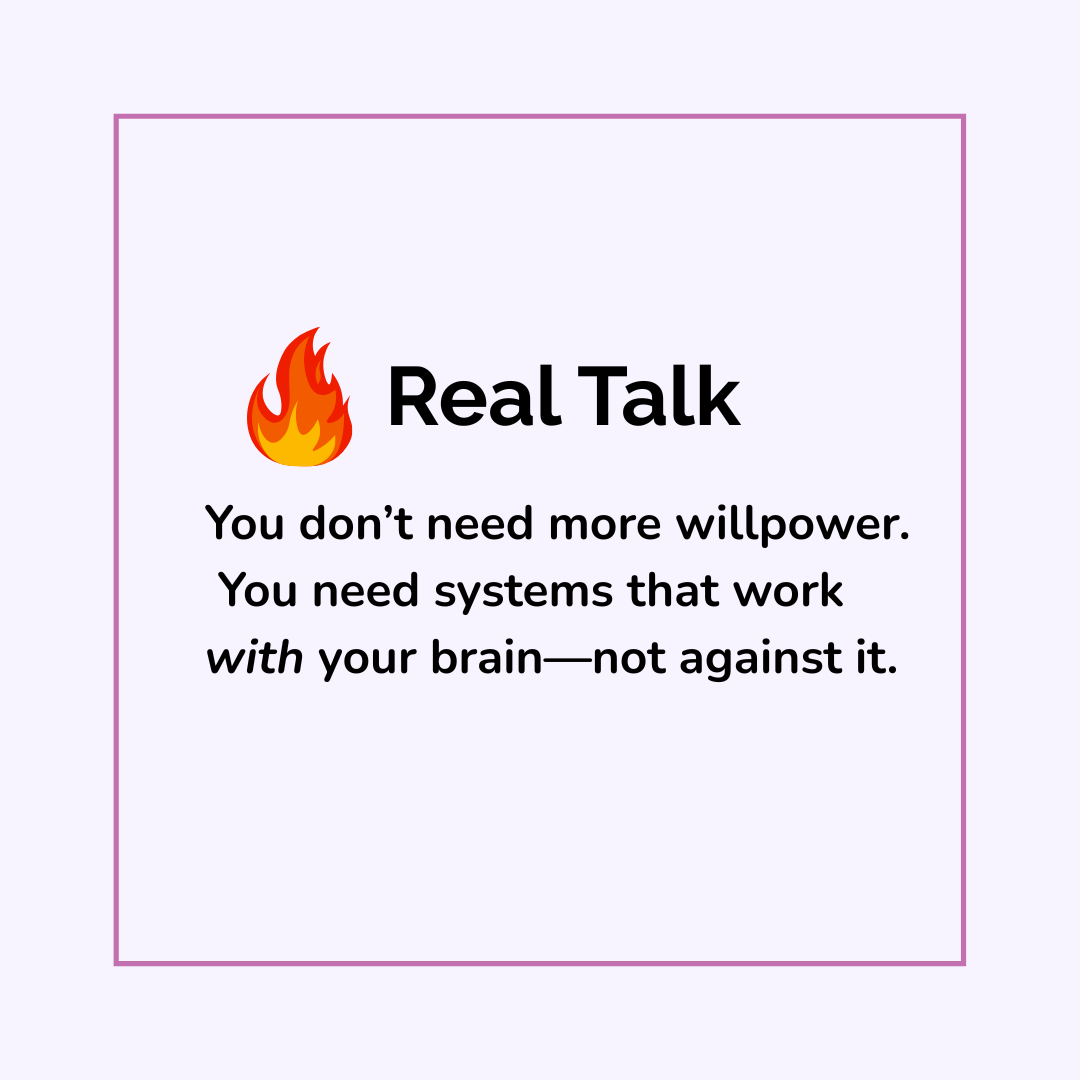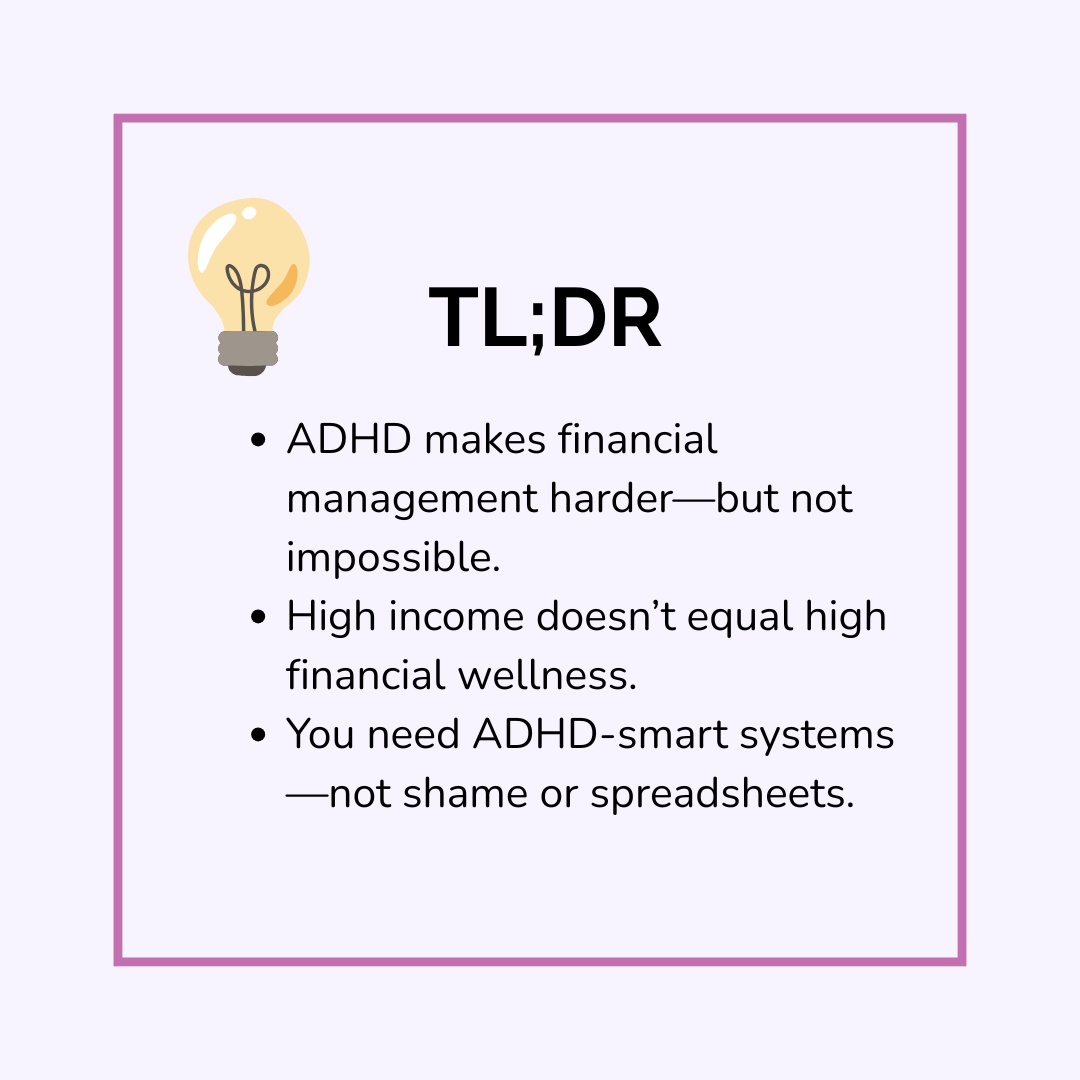Why High-Earning Women with ADHD Still Struggle with Money—and What to Do About It
“You’re making six figures…so why does your bank account feel like it’s constantly gasping for air?”
If you’ve ever asked yourself this, you’re not broken—and you’re definitely not alone.
Many brilliant, high-achieving women with ADHD feel like financial success is always just one step ahead of them, no matter how hard they work. The truth? ADHD changes the way your brain processes tasks like budgeting, planning, and resisting impulse purchases—and traditional financial advice just wasn’t made for you.
This post unpacks the real reasons why ADHD brains struggle with money and offers doable, judgment-free solutions that actually work for how your brain operates.
ADHD & Money: It's Not a Willpower Issue
First, let’s get this straight: ADHD is not about laziness or carelessness. ADHD affects your executive functions—like planning ahead, organizing information, delaying gratification, and managing time and energy.
All of those skills are foundational to healthy money habits. So when you have ADHD, managing money is like trying to play a video game on hard mode… with the controller constantly glitching.
👉 You forget bills until they’re late.
👉 You intend to track spending, but the app overwhelms you.
👉 You splurge on a “treat” because the day was emotionally exhausting… again.
And you’re not imagining it. According to research from Dr. Russell Barkley, up to 80% of adults with ADHD experience chronic difficulties with money. Adults with ADHD are also 2–3 times more likely to struggle with debt and have late payments.
(Source: Shopping is a nightmare: how ADHD affects people’s spending habits, The Guardian)
“People with ADHD tend to chase short-term rewards... Money management is built on delaying gratification.”
— Dr. Ari Tuckman, PsyD
So if you feel like your wallet’s never on the same page as your paycheck—this might be why.
Why This Hits Especially Hard for High-Earning ADHD Women
You’re not just juggling your career. You’re juggling your career, your calendar, your home, your mental health, your family, and the 74 tabs open in your brain. You might be:
Running a team at work while forgetting to pay your credit card bill.
Feeling immense shame when you overdraft… even though you earn more than ever.
Struggling to say “no” to emotional spending because burnout is constant.
And let’s not forget the emotional tax of being a high-functioning woman with undiagnosed (or late-diagnosed) ADHD. Society expects you to be organized, “on it,” and financially savvy. But inside, you’re overwhelmed and trying to survive.
“Women with ADHD are often underdiagnosed, overwhelmed, and overfunctioning.”
— Sari Solden, MS, therapist & author of Women with Attention Deficit Disorder
What Traditional Advice Gets Wrong
Here’s the problem: mainstream personal finance advice is built on assumptions like “you’ll remember,” “you’ll follow through,” or “you’ll be consistent.”
ADHD laughs in the face of that logic.
Here are a few examples of advice that doesn’t work for your brain:
“Just track your spending.” → Decision fatigue + data overload.
“Use willpower to stop impulse spending.” → ADHD is a dopamine-seeking disorder.
“Cut out the small stuff.” → Ignores emotional needs behind spending.
What Does Work: ADHD-Smart Money Solutions
You can absolutely build a money system that supports you—without shame, spreadsheets, or punishing discipline. Here’s how:
1. Automate Everything Possible
Set up automatic transfers for savings, bills, and retirement. Out of sight = off your plate = more executive bandwidth. It’s important to automate savings and investing as well as bill pay. This ensures you’re creating a healthy financial future. Start small with saving, as you get a handle on your budget you can always increase your automatic transfers.
💡 Tools to try:
Qapital (goal-based saving)
YNAB (visual budgeting with flexibility)
Your bank’s bill-pay scheduler
2. Make It Visual
Your brain craves visual cues. Color-code your budget, use trackers you can actually see, and ditch the boring black-and-white templates.
💡 Try:
A dashboard-style app like Monarch
Color-coded envelopes (digital or physical)
A whiteboard budget in your kitchen
3. Gamify the Process
ADHD brains love novelty and reward. Give yourself small wins!
💡 Ideas:
Habitica (gamified habit tracker)
Reward yourself after a money check-in
Use a sticker chart or coloring sheet to track debt payments—yes, seriously
4. Minimize Decision Fatigue
Pre-decide what spending is a “yes” (groceries, therapy, kids’ needs) and what gets a 24-hour hold (clothes, gadgets, Amazon scrolls).
For the items that get a 24-hour hold, feel free to drop the item in your cart, but wait at least 24 hours before hitting check out. Often, you’ll find you no longer need or want the item.
💡 Pro tip: Keep a “wishlist” in your phone or create a pinterest board or notion page for non-urgent purchases. Often, the dopamine passes—and so does the urge.
5. Set Reminders
Let’s face it, you have a finite amount of bandwidth. And with everything else claiming your time and attention, sometimes money stuff falls through the cracks.
To avoid this, set up reminders for yourself. If there are bills you can’t automate or accounts you need to check in on, put it on your calendar. Choose a separate color for all things money so you can see at a glance what you need to do.
You’ll also want to create a weekly “money check-in” appointment for yourself. Schedule it for a time when you won’t be distracted. Do it over a cup of coffee or with a glass of wine. It will only take 15-30 minutes.
6. Don’t Do It Alone
You’re not meant to white-knuckle your way through your finances. ADHD-friendly financial coaching, body-doubling, or accountability partners can make a huge difference.
“Support and structure beat shame every time.”
— René Brooks, Black Girl, Lost Keys
You’re Not Broken. The System Wasn’t Built for You.
If managing money feels harder than it “should,” it’s because you’ve been handed tools that were never meant for your brain.
But you’re also someone with incredible creativity, ambition, and resilience. You’ve built a career, a life, and a future out of that brilliance. Let’s extend that same compassion and strategy to your finances.
Action Steps: Try This Week
✅ Automate one bill or transfer
✅ Set a 30-minute “money date” with music + snacks
✅ Download an ADHD-friendly budgeting app
✅ Talk to a coach who gets it
Need Help Building ADHD-Smart Money Systems?
This is exactly what I help women like you do—without judgment, jargon, or shame. You deserve to feel confident with your money.
💬 Book a free clarity call


